| |
Date |
Event(s) |
| 1 | 1929 | - 15 Jan 1929—4 Apr 1968: Martin Luther King, Jr. is born
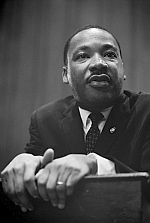
Martin Luther King Jr. was an American Baptist minister and activist, one of the most prominent leaders in the civil rights movement from 1955 until his assassination in 1968. An African-American church leader and a son of early civil rights activist and minister Martin Luther King Sr., King advanced civil rights for people of color in the United States through nonviolence and civil disobedience. Inspired by his Christian beliefs and the nonviolent activism of Mahatma Gandhi, he led targeted, nonviolent resistance against Jim Crow laws and other forms of discrimination.
- 29 Oct 1929—1939: The Great Depression
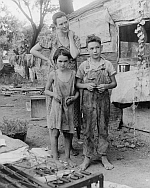
The Great Depression started in the United States after a major fall in stock prices that began around September 4, 1929, and became worldwide news with the stock market crash of October 29, 1929 (known as Black Tuesday). Between 1929 and 1932, worldwide gross domestic product (GDP) fell by an estimated 15%. By comparison, worldwide GDP fell by less than 1% from 2008 to 2009 during the Great Recession. Some economies started to recover by the mid-1930s. However, in many countries the negative effects of the Great Depression lasted until the beginning of World War II.
|
| 2 | 1930 | - 1930—1935: The Golden Age of Radio
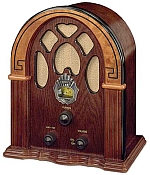
Radio broadcasting was the cheapest form of entertainment, and it provided the public with far better entertainment than most people were accustomed to. As a result, its popularity grew rapidly in the late 1920s and early 1930s, and by 1934, 60 percent of the nation’s households had radios. One and a half million cars were also equipped with them. The 1930s were the Golden Age of radio. It was so popular that theaters dared not open until after the extremely popular “Amos ‘n Andy” show was over.
|
| 3 | 1933 | |
| 4 | 1939 | - 1939: First publicly accessible television broadcast

During the 1939 World's Fair David Sarnoff, president of RCA, unveiled the first commercial publicly accessible television broadcast. In Flushing NY, he proclaimed "Now we add sight to sound" and during the opening ceremonies of the fair on April 30th, FDR became the first president to ever be televised. TV sets went on sale to the public the very next day, and RCA/NBC began regular broadcasts on a daily basis. By the end of the 30s, there were a few hundred televisions in America.
By 1948, 2 million television sets were in American homes (of which 720,000 were in New York City alone.) On September 4th, 1951 the first coast-to-coast telecast was aired as President Truman spoke to 13 million television sets.
- 3 Sep 1939—2 Sep 1945: World War II
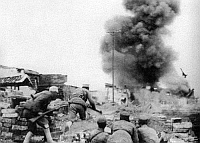
World War II or the Second World War, often abbreviated as WWII or WW2, was a global conflict that lasted from 1939 to 1945. The vast majority of the world's countries, including all of the great powers, fought as part of two opposing military alliances: the Allies (lead by the Soviet Union, United Kingdom, United States and China) and the Axis (lead by Germany, Japan, and Italy). Many participants threw their economic, industrial, and scientific capabilities behind this total war, blurring the distinction between civilian and military resources. Aircraft played a major role, enabling the strategic bombing of population centres and the only two nuclear weapons ever used in war.
World War II was by far the deadliest conflict in human history; it resulted in 70 to 85 million fatalities, mostly among civilians. Tens of millions died due to genocides (including the Holocaust), starvation, massacres, and disease.
|
| 5 | 1941 | - 24 May 1941: Bob Dylan is born
Bob Dylan (born Robert Allen Zimmerman, May 24, 1941) is an American singer-songwriter. Often regarded as one of the greatest songwriters of all time, Dylan has been a major figure in popular culture during a career spanning more than 60 years. Much of his most celebrated work dates from the 1960s, when songs such as "Blowin' in the Wind" (1963) and "The Times They Are a-Changin'" (1964) became anthems for the civil rights and antiwar movements.
- 7 Dec 1941: Pearl Harbor is bombed
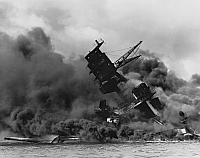
The attack on Pearl Harbor was a surprise military strike by the Imperial Japanese Navy Air Service against the United States naval base at Pearl Harbor, Hawaii Territory, on the morning of December 7, 1941.
The surprise attack came as a profound shock to the American people and led directly to the American entry into World War II in both the Pacific and European theatres. There were precedents for unannounced military action by Japan, but the lack of any formal warning, particularly while negotiations were still apparently ongoing, led President Franklin D. Roosevelt to proclaim December 7, 1941, "a date which will live in infamy". Because the attack happened without a declaration of war and without explicit warning, the attack on Pearl Harbor was later judged in the Tokyo Trials to be a war crime.
|
| 6 | 1942 | - 1942: Mass production of penicillin
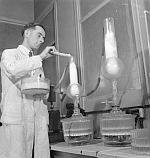
On March 14, 1942, the first patient was treated for streptococcal sepsis with US-made penicillin produced. Half of the total supply produced at the time was used on that one patient, Anne Miller. By June 1942, just enough US penicillin was available to treat ten patients. As a direct result of the WWII and the War Production Board, by June 1945, over 646 billion units per year were being produced.
|
| 7 | 1945 | |
| 8 | 1950 | |
| 9 | 1953 | - 1953—1977: Elvis Presley
Elvis Aaron Presley (January 8, 1935 – August 16, 1977), often referred to mononymously as Elvis, was an American singer and actor. Dubbed the "King of Rock and Roll", he is regarded as one of the most significant cultural figures of the 20th century.
- 20 Jan 1953—20 Jan 1961: President Dwight D. Eisenhower
34th President of the United States. Born October 14, 1890. Died March 28, 1969 at the age of 79.
|
| 10 | 1954 | - 1954—1968: Civil Rights Movement
The civil rights movement was a nonviolent social and political movement and campaign from 1954 to 1968 in the United States to abolish legalized institutional racial segregation, discrimination, and disenfranchisement throughout the United States. The movement had its origins in the Reconstruction era during the late 19th century, although it made its largest legislative gains in the 1960s after years of direct actions and grassroots protests. The social movement's major nonviolent resistance and civil disobedience campaigns eventually secured new protections in federal law for the civil rights of all Americans.
- Apr 1954: First mass produced color TV
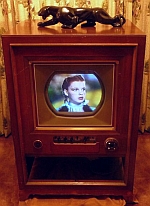
The RCA CT-100 was an early all-electronic consumer color television introduced in April 1954. The color picture tube measured 15 inches diagonally. The viewable picture was just 11½ inches wide. The CT-100 wasn't the world's first color TV, but it was the first to be mass produced, with 4400 having been made.
|
| 11 | 1955 | - 1955: Vaccine for Polio
Before a polio vaccine became available, several polio epidemics had occurred between 1948 and 1955. In 1955 Dr. Jonas E. Salk and colleagues research and develop a polio vaccine.
- 1 Nov 1955—30 Apr 1975: Vietnam War
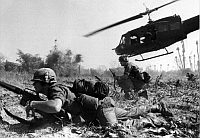
The Vietnam War was a conflict in Vietnam, Laos, and Cambodia from 1 November 1955 to the fall of Saigon on 30 April 1975. It was the second of the Indochina Wars and was officially fought between North Vietnam and South Vietnam. The north was supported by the Soviet Union, China, and other communist states, while the south was supported by the United States and other anti-communist allies. The war is widely considered to be a Cold War-era proxy war. It lasted almost 20 years, with direct U.S. involvement ending in 1973. The conflict also spilled over into neighboring states, exacerbating the Laotian Civil War and the Cambodian Civil War, which ended with all three countries becoming communist states by 1975.
|
| 12 | 1959 | - 25 Jan 1959: First scheduled transcontinental passenger flight
On Jan. 25, 1959, the first scheduled transcontinental passenger jet flight took place, a non-stop American Airlines trip from California to New York.
|
| 13 | 1960 | - 1960—1970: The Beatles
The Beatles were an English rock band, formed in Liverpool in 1960, that was comprised of John Lennon, Paul McCartney, George Harrison and Ringo Starr. They are regarded as the most influential band of all time
|
| 14 | 1961 | |
| 15 | 1963 | |
| 16 | 1969 | - 20 Jan 1969—9 Aug 1974: President Richard Nixon
37th President of the United States. Born Jan. 9, 1913. Died Apr. 22, 1994 at the age of 81.
The Watergate scandal was a major political scandal in the United States involving the administration of President Richard Nixon from 1972 to 1974 that led to Nixon's resignation. The scandal stemmed from the Nixon administration's continual attempts to cover up its involvement in the June 17, 1972 break-in of the Democratic National Committee headquarters at the Washington, D.C., Watergate Office Building.
|
| 17 | 1981 | - 20 Jan 1981—20 Jan 1989: President Ronald Reagan
40th President of the United States. Born February 6, 1911. Died June 5, 2004 at the age of 93.
The silence of Nancy Reagan and President Ronald Reagan on HIV/AIDS lasted for several years, with the president waiting until 1985 to directly address the issue while answering a reporter's question. It would be two more years until he made his first major address on the health issue in 1987.
- 5 Jun 1981: HIV / AIDS first reported
The first news story on the disease appeared on May 18, 1981, in the gay newspaper "New York Native". AIDS was first clinically reported on June 5, 1981, with five cases in the United States. By 1989, AIDS was estimated to be the second leading cause of death in men ages 25-44; surpassing heart disease, cancer, suicide, and homicide. In 1988, AIDS ranked eighth among causes of death among women 25-44 years of age. By 1990, 100,777 people in the United States alone were dead from AIDS.
Some authors consider HIV/AIDS a global pandemic. As of 2016 approximately 36.7 million people worldwide have HIV, the number of new infections that year being about 1.8 million. This is down from 3.1 million new infections in 2001. It resulted in about 1 million deaths in 2016, down from a peak of 1.9 million in 2005.
|
